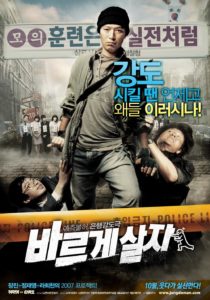The Winners
大赢家
China, 2020, colour, 2.35:1, 96 mins.
Director: Yu Miao 于淼.
Rating: 6/10.
Absurdist comedy about a fake bank robbery has a fine ensemble feel but too much suspension of disbelief.
Jinling city, Jiangsu province, central China, the present day. To test its responsiveness to bank robberies, the local police force partners with China Minfeng Bank in a staged exercise. Loyal back-office employee Yan Jin (Da Peng), who lives at home with his parents (Tenger, Xu Di) and mute younger sister (Xia Zhen), has no life outside his work, and is over-conscientious to the point of infuriating bank manager Wu Xiaojiang (Tian Yu), is selected by the police chief (Du Yuan) to play the role of the robber. Yan Jin prepares meticulously for the part and is supported by his family. Meanwhile, the bank readies a supply of fake currency to be “stolen”. On the pre-arranged day, just before closing time, Yan Jin enters the bank and holds it up with a fake rifle while the money is loaded into a wheelie by cashiers Yu Haijiao (Liu Yan) and Xing Yunzhu (Dai Lele). He also holds hostage the few remaining customers – a grandfather (Zhang Shaorong) and grandson (Yang Yanduo), and a heavily pregnant woman (Tao Hui) – and “shoots dead” an undercover police detective, Yao (Zhang Zixian). When the police arrive outside, he orders the front doors’ security grill to be closed; and when Yu Haijiao can’t open it again, he insists on carrying on with the “robbery”, despite Wu Xiaojiang’s remonstrations to finish the exercise, saying he has a duty to try to escape”. The police chief has no option but to continue the exercise, as they have failed to stop him so far. Yan Jin moves to his pre-prepared Plan B, demanding everyone hands in their mobile phones. Xing Yunzhu, who has a toothache and wants to go to a dentist, objects but is forced to play along. The police send in an undercover policewoman (Qu Jingjing), posing as a doctor to check the pregnant woman, but Yan Jin spots the ruse and the two fight. Yan Jin wins, using a fake gun lent him by the “dead” Yao, and “shoots dead” the policewoman. Meanwhile, the media and crowds have gathered outside to watch, and Wu Xiaojiang is urged by his superior to get Yan Jin to stop the exercise. The police chief sees the situation as a challenge for his force, and then decides to send in a SWAT team from the rear. As the exercise escalates, night falls and Yan Jin switches to his final option.
REVIEW
An over-conscientious bank employee refuses to stand down during a fake robbery organised by the town’s police force in The Winners 大赢家, an absurdist comedy with a large ensemble cast led by popular Mainland farceur Da Peng 大鹏 (aka Dong Chengpeng 董成鹏). After a couple of shots at broadening his range into less-goofy roles (twisty crime drama Vortex 铤而走险, 2019; black rom-com My Dear Liar 受益人, 2019), 38-year-old Da Peng (Jianbing Man 煎饼侠, 2015; City of Rock 缝纫机乐队, 2017) is in a more familiar role here, with his trademark spectacles and straightfaced humour, and he’s supported by a practised cast of character actors who have good ensemble chemistry. A lightly enjoyable satire on how “playing the game” can sometimes go too far, the film is weakened by the need to constantly reinforce the suspension of disbelief required of the audience, raising the question of whether a broader, more slapstick approach would have been better. Originally set for Chinese New Year, the movie was finally released in late March, during a brief window in the coronavirus cinema shutdown that quickly closed again. Box office (unreported) was necessarily tiny.
 Set almost entirely within the bank itself, The Winners has the feel of a play adaptation. In fact it’s based on a 1991 Japanese film, Bang! 遊びの时间は終らない (literally, “Playtime Never Ends”, see poster, left), written by Saito Hiroshi 齐藤ひろし from an original story by Toi Kunihiko 都井邦彦, and directed by Haginiwa Sadaki 萩庭贞明. That film was already remade, successfully, in South Korea as Going by the Book 바르게 살자 (2007, below left), scripted by ace film-maker Jang Jin 장진 | 张镇 (Guns & Talks 킬러들의 수다, 2001; Someone Special 아는 여자, 2004) and directed by Ra Heui-chan 라희찬 | 罗喜灿 (Mr. Idol Mr. 아이돌, 2011). Excluding their openings and closings, all three films are remarkably similar in their core plots. Tonally, the three films’ differences are mostly rooted in national characteristics: the Japanese gruffer and more hierarchical, the Korean
Set almost entirely within the bank itself, The Winners has the feel of a play adaptation. In fact it’s based on a 1991 Japanese film, Bang! 遊びの时间は終らない (literally, “Playtime Never Ends”, see poster, left), written by Saito Hiroshi 齐藤ひろし from an original story by Toi Kunihiko 都井邦彦, and directed by Haginiwa Sadaki 萩庭贞明. That film was already remade, successfully, in South Korea as Going by the Book 바르게 살자 (2007, below left), scripted by ace film-maker Jang Jin 장진 | 张镇 (Guns & Talks 킬러들의 수다, 2001; Someone Special 아는 여자, 2004) and directed by Ra Heui-chan 라희찬 | 罗喜灿 (Mr. Idol Mr. 아이돌, 2011). Excluding their openings and closings, all three films are remarkably similar in their core plots. Tonally, the three films’ differences are mostly rooted in national characteristics: the Japanese gruffer and more hierarchical, the Korean  darker and more poe-faced, and the Chinese the lightest and most relaxed in its humour.
darker and more poe-faced, and the Chinese the lightest and most relaxed in its humour.
It’s the latest production by husband-and-wife writing couple Yu Miao 于淼 and Li Xiao 李潇 who, since graduating from TV dramas a few years ago, have worked exclusively on Chinese remakes. They initially scripted My Best Friend’s Wedding 我最好朋友的婚礼 (2016), a lacklustre version of the 1997 US rom-com relocated to Europe, and Some Like It Hot 情圣 (2016), a much better remake of the 1976 French comedy Pardon Mon Affaire Un éléphant ça trompe énormément, which was a surprise end-of-year hit in the Mainland. Riding high on that, Yu and Li next came up with Kill Mobile 来电狂响 (2018), the latest re-make of the Italian film Perfect Strangers Perfetti sconosciuti (2016), which also ended up with a handsome RMB641 million – just below Hot‘s RMB660 million. Mobile also marked Yu’s debut as a feature director, with Li co-writing with other collaborators.
On Winners, Li also takes a creative producer 监制 credit, as well as co-writing with Yu and Hot‘s Wang Si 王思. Their biggest change – which affects the whole dynamic of the movie – is making the “robber” an employee of the bank rather than a lowly member of the police force, added to which he’s also derided by his colleagues and hated by his employer because of his extreme conscientiousness bordering on OCD. This is rather obviously underlined by naming him Yan Jin (exactly the same as the Mandarin word for “meticulous”, 严谨 yánjĭn), which leads to one quite funny joke early on and actually makes the whole film much more of a piece as he desperately tries to prove that he can pull the whole show off in front of his mocking co-workers.
It’s a perfect role for the straightfaced-cum-poignant humour of Da Peng, and knits the whole ensemble cast together in a very natural way as they reluctantly go along with the exercise long after it’s proven its point. But as things escalate, the script has to continually come up with reasons for the staff’s continuing compliance and the police force’s continuing agreement – both of which put a strain on the humour and the viewer’s willingness to go along with the central idea.
Despite that, the ensemble performances – as in Hot – are fine right down to the smallest parts, but especially by TV’s Dai Lele 代乐乐 (the dinner-party hostess in Mobile) as a feisty cashier with toothache, Tian Yu 田雨 (the host in Mobile) as the bank’s slimy manager, stand-up comedian Meng Hetang 孟鹤堂 in his film debut as a smoothie lobby manager, Zhang Zixian 张子贤 as a detective trapped inside the bank, and Liu Yan 柳岩 as a cashier who takes a shine to the stressed-out Yan Jin. Both Zhang and Liu co-starred with Da Peng in My Dear Liar, and their chemistry together is evident. As an undercover cop who has a knockout “fight” with Yan Jin, actress Qu Jingjing 屈菁菁 (the duplicitous girlfriend in offbeat comedy Once Upon a Time in the Northeast 东北往事 破马张飞, 2016) has her moment.
The film’s technical package is smooth and free of distracting visual trickery, led by the widescreen photography of Gao Hu 高虎 (from Da Peng vehicles Father and Son 父子雄兵, 2017, and City of Rock) as it subtly tracks the action from afternoon to evening. Exteriors were shot in Tongling city, Anhui province, not so far from the fictional setting. The film’s Chinese title is identical to that of the Hong Kong CNY crime comedy Winner Takes All (2000), directed by Gao Zhisen 高志森 [Clifton Ko].
CREDITS
Presented by Tianjin Xiron Entertainment (CN), Shanghai White Whale Picture (CN), Tianjin Lian Ray Pictures (CN), Zhejiang Hengdian Film (CN), Tianjin Maoyan Weiying Cultural Media (CN), Risen Productions (Shanghai) (CN).
Script: Li Xiao, Yu Miao, Wang Si. Original script: Saito Hiroshi. Photography: Gao Hu. Editing: Lin An’er [Angie Lam], Mai Zishan [Marco Mak]. Music: Peng Fei, Yang Meng. Production design: Lu Wei. Art direction: Wang Min. Costumes: He Tianjiao. Styling: Fu Lei. Sound: Mao Xiaolei, Yang Jiang, Zhao Nan. Action: Zhuang Yuanzhang. Visual effects: Yuan Huatang, Wu Zhen (Source VFX). Executive direction: Qian Ru.
Cast: Da Peng [Dong Chengpeng] (Yan Jin), Liu Yan (Yu Haijiao, cashier), Dai Lele (Xing Yunzhu, cashier), Zhang Zixian (Yao, police detective), Tian Yu (Wu Xiaojiang, bank manager), Meng Hetang (Zhou You, lobby manager), Tao Hui (pregnant woman), Xu Di (Yan Jin’s mother), Du Yuan (police chief), Wang Ge (Xiaopang/Fattie), Aru’na (Bao’er, security guard), Zhang Shaorong (grandfather), Zhang Fan (Zhang, police superintendent), Yang Yanduo (grandson), Xia Zhen (Yan Jin’s younger sister), Zang Hongfei (Zhang Chi, pregnant woman’s husband), Du Weihan (SWAT team leader), Qiao Chengyi (TV cameraman), Meng Fei (TV reporter), Qu Jingjing (undercover policewoman), Tenger (Yan Jin’s father), Geng Yeting, Sheng Gangshuai, Pang Bo, Huang Tao (SWAT team), Jiang Zhigang (sniper), Li Pei’en (spotter), Ye Xiyue (Yao’s wife).
Release: China, 20 Mar 2020.
